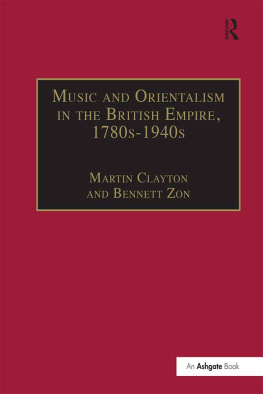
T. E. Lawrence (of Arabia) described his war-time chief as the perfect leader, a man who worked by influence rather than by loud direction. He was like water, or permeating oil, creeping silently and insistently through everything. It was not possible to say where Clayton was and was not, and how much really belonged to him.
This is the first biography of General Sir Gilbert Clayton (18751929), Britains pre-eminent man-on-the-spot during the formative years of the modern Middle East. Serving as a soldier, administrator and diplomat in ten different Middle Eastern countries during a 33-year Middle Eastern career, Clayton is best known as the Director of British Intelligence in Cairo during the Great War (191416), and as the instigator and sponsor of the Arab Revolt against the Turks.
Dedicated to the preservation of Britains Middle Eastern empire, Clayton came to realize that in the transformed post-war world Britain could ill afford to control all aspects of the emerging nation-states in the region. In his work as adviser to the Egyptian government (191922), he advocated internal autonomy for the Egyptians, while asserting Britains vital imperial interests in the country. As chief administrator in Palestine (19235), he sought to reconcile the Arabs to Britains national home policy for the Jews, and, at the same time, to solidify Britains position as Mandatory power. In Arabia, Clayton negotiated the first post-war treaties with the emerging power of Ibn Saud, (1925, 1927), but curtailed his designs on the British Mandates in Iraq and Transjordan. And, in Iraq, where Clayton served as High Commissioner (1929), he backed Iraqs independence within the framework of the British Empire.
Timothy J. Paris holds a B.A. in history from Duke University and a J.D. from Indiana University. In 1997, he received a Ph.D. in history from Cambridge University. His first book, Britain, the Hashemites and Arab Rule, 19201925: The Sherifian Solution, was published in 2003. Dr. Paris currently practices law in Phoenix, Arizona.
General Gilbert Clayton played a central part in the war against the Ottoman Empire and the subsequent partition of the Middle East. This is a full, critical, and original account not only of a key personality but also such major issues as the Sykes-Picot agreement and the Balfour Declaration. Even on such well-known figures as T.E. Lawrence, Timothy Paris provides valuable and persuasive assessment. A masterly work. W M. R OGER L OUIS, University of Texas, past-president of the American Historical Association and editor-in-chief of the Oxford History of the British Empire
Sir Gilbert Clayton was only 53 when he died suddenly in Baghdad in September 1929, a few months after arriving there as ambassador, but, as this admirably comprehensive biography shows, he had already spent some more than 30 years in the Middle East. Clayton was a principled pragmatist, one of a growing band of latter-day servants of empire whose practical experience gradually led him to conclude that direct rule, or even enlightened indirect rule, over colonial territories, was becoming less and less of a practical proposition. Basing his account on official and private papers, Dr Paris account ably traces Claytons singular, if largely unacknowledged, contributions to Britains moment in the Middle East. P ETER S LUGLETT, Director of the Middle East Institute at the National University of Singapore
Gilbert Claytons career in the Middle East spanned over thirty years, most notably as head of British intelligence in Cairo during World War I. A key figure in British policy during the war and after, his role has never been fully acknowledged in previous scholarship. Thanks to Tim Paris, we now have a deeply researched, analytical study of Claytons life and work in the service of the British Empire in the Arab world at a key transitional moment, based largely on numerous archival sources. This book will serve as a major resource for scholars of the period. C HARLES D. S MITH, Professor Emeritus of Middle East History, University of Arizona
Copyright Timothy J. Paris, 2016.
Published in the Sussex Academic e-Library, 2016.
SUSSEX ACADEMIC PRESS
PO Box 139
Eastbourne BN24 9BP, UK
and simultaneously in the United States of America and Canada
All rights reserved. Except for the quotation of short passages for the purposes of criticism and review, no part of this publication may be reproduced, stored in a retrieval system or transmitted in any form or by any means, electronic, mechanical, photocopying, recording or otherwise, without the prior permission of the publisher.
British Library Cataloguing in Publication Data
A CIP catalogue record for this book is available from the British Library.
Library of Congress Cataloging-in-Publication Data
Applied for.
ISBN 978-1-78284-274-3 (e-pub
ISBN 978-1-78284-275-0 (e-mobi)
ISBN 978-1-78284-276-7 (e-pdf)
This e-book text has been prepared for electronic viewing. Some features, including tables and figures, might not display as in the print version, due to electronic conversion limitations and/or copyright strictures.
Contents
Acknowledgments
Fifty years ago one of Sir Gilbert Claytons friends described him as a man who had a talent for keeping his own counsel. That was perhaps a desirable trait in a man who served as director of British Intelligence in the Middle East during the Great War, and as one of Britains pre-eminent political officers and diplomats in that region in the years following. For the biographer, however, the reticence of ones subject is not a helpful characteristic. Still, owing to the help I received from so many individuals and institutions, I encountered no great difficulties in coming to an understanding of Clayton or his views on the varied and complex issues he confronted in his professional life, a career that spanned thirty-three years and encompassed no fewer than ten different Middle Eastern countries and territories.
I must begin with the Clayton family who extended their kind hospitality and provided much information about Sir Gilbert without in any way attempting to restrict or influence this work. Dr John P. Clayton, C.V.O., met with me in York, London, Windsor and Wiltshire, answered numerous questions and provided a wealth of anecdotal information concerning his father. Sir Gilberts grandson, also known as Bertie Clayton, and his wife Rosalind, welcomed me into their home and shared with me an unpublished family history prepared by Sir Gilberts father, W. L. N. Clayton, as well as photographs and memorabilia associated with Sir Gilberts career. David Thorne and his wife Susannah, Claytons great-granddaughter, also supplied information and photos and I learned much from Davids researches in family history as reflected on his helpful website. I must also thank Perry and Gyr King, grandsons of Sir Gilberts brother, Admiral John Clayton (18881952), who allowed access to their grandmothers diaries. And Gyr and his wife Nicola, kindly invited me into their home for a few days while I read them. Claytons niece Margaret, and her husband Professor Justin Gosling, provided a typescript of the unpublished memoir of Sir Gilberts brother, Sir Iltyd Nicholl Clayton (18861955).
A number of academics answered enquiries concerning this project. Among these, I owe a special debt to Professor M. W. Daly, who allowed me to draw on his extensive knowledge of Middle Eastern history and very generously provided documents from his own collections, including copies of papers relating to Clayton kept at the Weizmann Archive in Rehovot, Israel. Professors Charles D. Smith, Peter Sluglett, Charles Tripp and William Roger Louis also answered queries or provided helpful information, as did Dr Toby Dodge and Dr Yigal Sheffy and Professor Eugene Rogan of the Oriental Institute and St. Antonys College, Oxford. Sir Roger Tomkys, who has taken an interest in my work for more than twenty years, also advised me on this project, read a draft of the entire manuscript and offered helpful suggestions for its improvement. I must thank the Master and Fellows of Pembroke College, Cambridge, who extended their hospitality to an Old Member. Sir Richard Dearlove, former Master of the College, also kindly assisted with an enquiry. Several local historians on the Isle of Wight provided helpful information. Most importantly, Sister Eustochium of St. Cecilias Abbey at Ryde former site of the Isle of Wight College supplied plans of the old College grounds and information concerning Claytons time at the College. Patrick Nott, Diana Wood, Kate McDonnell, Gillian Burnett, Ann Barrett and Sheila Caws answered questions concerning the Isle of Wight, as did Chris Yendall of the Carisbrooke Castle Museum. Mr. R. E. Brinton supplied documents and a Nineteenth Century prospectus of the Isle of Wight College.














